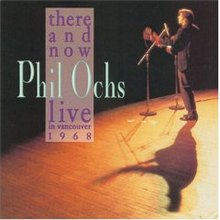
Philip David Ochs was an American protest singer and songwriter who was known for his sharp wit, sardonic humor, political activism, often alliterative lyrics, and distinctive voice. He wrote hundreds of songs in the 1960s and 1970s and released eight albums.

The Chicago Seven were seven defendants—Abbie Hoffman, Jerry Rubin, David Dellinger, Tom Hayden, Rennie Davis, John Froines, and Lee Weiner—charged by the United States federal government with conspiracy, crossing state lines with intent to incite a riot, and other charges related to anti–Vietnam War and countercultural protests in Chicago, Illinois during the 1968 Democratic National Convention. The Chicago Eight became the Chicago Seven after the case against co-defendant Bobby Seale was declared a mistrial during the trial.
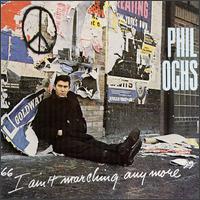
I Ain't Marching Anymore is Phil Ochs' second LP, released on Elektra Records in 1965.

Greatest Hits was Phil Ochs' seventh LP and final studio album. Contrary to its title, it offered ten new tracks of material, mostly produced by Van Dyke Parks, and was released in 1970.
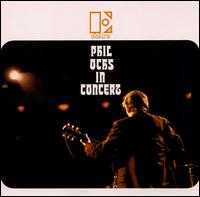
Phil Ochs in Concert is Phil Ochs' third long player, released in 1966 on Elektra Records. Despite its title, it was not entirely live, as several tracks were actually recorded in the studio, owing to flaws in the live recordings made in Boston and New York City in late 1965 and early 66. The album's producers retained the essence of a live album by including song patter and audience reactions between and during the songs. Phil Ochs in Concert features many of the folksinger's most enduring songs and represents the culmination of Ochs' folk career, the last of his original albums to be all-acoustic.

Tape from California is Phil Ochs' fifth album, released in mid-1968 on A&M Records. It continues Ochs' musical shift away from straight-ahead protest songwriting toward more orchestral and baroque arrangements.
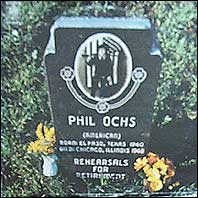
Rehearsals for Retirement is Phil Ochs's sixth album, released in 1969 on A&M Records.
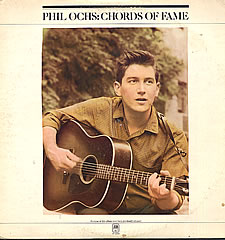
Chords Of Fame was a 2-LP compilation of folksinger Phil Ochs' career, compiled by his brother shortly after Ochs' death in 1976. Released on A&M Records, it compiled tracks Ochs had recorded for both that label and Elektra Records. The compilation included several rarities:

The War Is Over: The Best of Phil Ochs is a 1988 compilation album of Phil Ochs' works on A&M Records recorded between 1967 and 1970. With varying amounts of tracks from the albums, between two and five, from each album except Gunfight At Carnegie Hall, it paints a portrait of Ochs' later works that does not emphasize his folk songs, instead presenting the more introspective and/or experimental tracks. It did feature a live version of "I Ain't Marching Anymore" later reissued as a part of the 1991 album that presented the entire concert from which it was culled, There And Now: Live in Vancouver 1968.
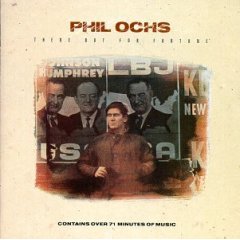
There but for Fortune was a 1989 compilation that summed up the three albums that Phil Ochs recorded for Elektra Records between 1964 and 1966. The album drew heavily from the third, presenting ten of its eleven tracks, and presenting six and five respectively from the first and second.

American Troubadour is a 1997 British 2-CD set that presented a portrait of singer-songwriter Phil Ochs' later career, featuring selections from each of the five albums he recorded for A&M Records, from various non-album single sides and from a performance Ochs gave on March 13, 1969, in Vancouver, British Columbia. It is notable for the inclusion of Ochs' post-1970 single sides, otherwise unavailable on compact disc and for the inclusion of a cover of Chuck Berry's "School Days", a previously unavailable outtake from Ochs' infamous March 27, 1970, concert at Carnegie Hall.

Farewells & Fantasies is the 1997 posthumous box set of the work of singer/songwriter Phil Ochs, chronicling his life and career in music from 1964 through 1970. With its non-chronological running order, it plays like three separate albums, each showcasing a different side of Ochs. The compilation was produced by Gary Stewart, Michael Ochs and Meegan Lee Ochs. Liner notes include a foreword by Meegan Lee Ochs, "The Sound of Freedom Callin'" by Michael Ventura and "Song of a Soldier: The Life and Times of Phil Ochs" by Mark Kemp, track-by-track explanations by Ben Edmonds, discography, selected bibliography, and many photographs, some of which are from the family's private collections. The box set is dedicated to a friend, co-writer, and inspiration to Phil Ochs, Bob Gibson, who died while the box set was in production. Its title comes from the back of Ochs' LP Tape from California.
"School Days" is a rock-and-roll song written and recorded by Chuck Berry and released by.Chess Records as a single in March 1957 and on the LP After School Session two months later. It is one of his best-known songs and is often considered a rock-and-roll anthem.
Jim and Jean, composed of Jim Glover and Jean Ray (1941–2007) were an American folk music duo, who performed and recorded music from the early to the late 1960s.
Jim R. Glover is an American peace activist and folk singer. He is from Cleveland, Ohio and lives in Brandon, Florida.
"The War Is Over" is an anti-war song by Phil Ochs, an American protest singer in the 1960s and early 1970s, who is known for being a harsh critic of the war in Vietnam and the American military-industrial establishment. The song, which was originally released on Tape from California (1968), has been described as "one of the most potent antiwar songs of the 1960s".
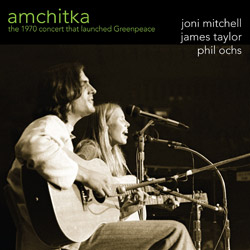
Amchitka is a 2009 two-CD release of a recording of Joni Mitchell, James Taylor and Phil Ochs performing an October 16, 1970, benefit concert at the Pacific Coliseum in Vancouver. The event funded Greenpeace's protests of 1971 nuclear weapons tests by the U.S. Atomic Energy Commission at Amchitka, Alaska.
"Crucifixion" is a 1966 song by Phil Ochs, a US singer-songwriter. Ochs described the song as "the greatest song I've ever written".

Phil Ochs: There but for Fortune is a documentary film on the life and times of folk singer-songwriter Phil Ochs. The film, released theatrically in January 2011, was written and directed by Kenneth Bowser. Its title is taken from one of Ochs' best known songs, "There but for Fortune" (1963).
